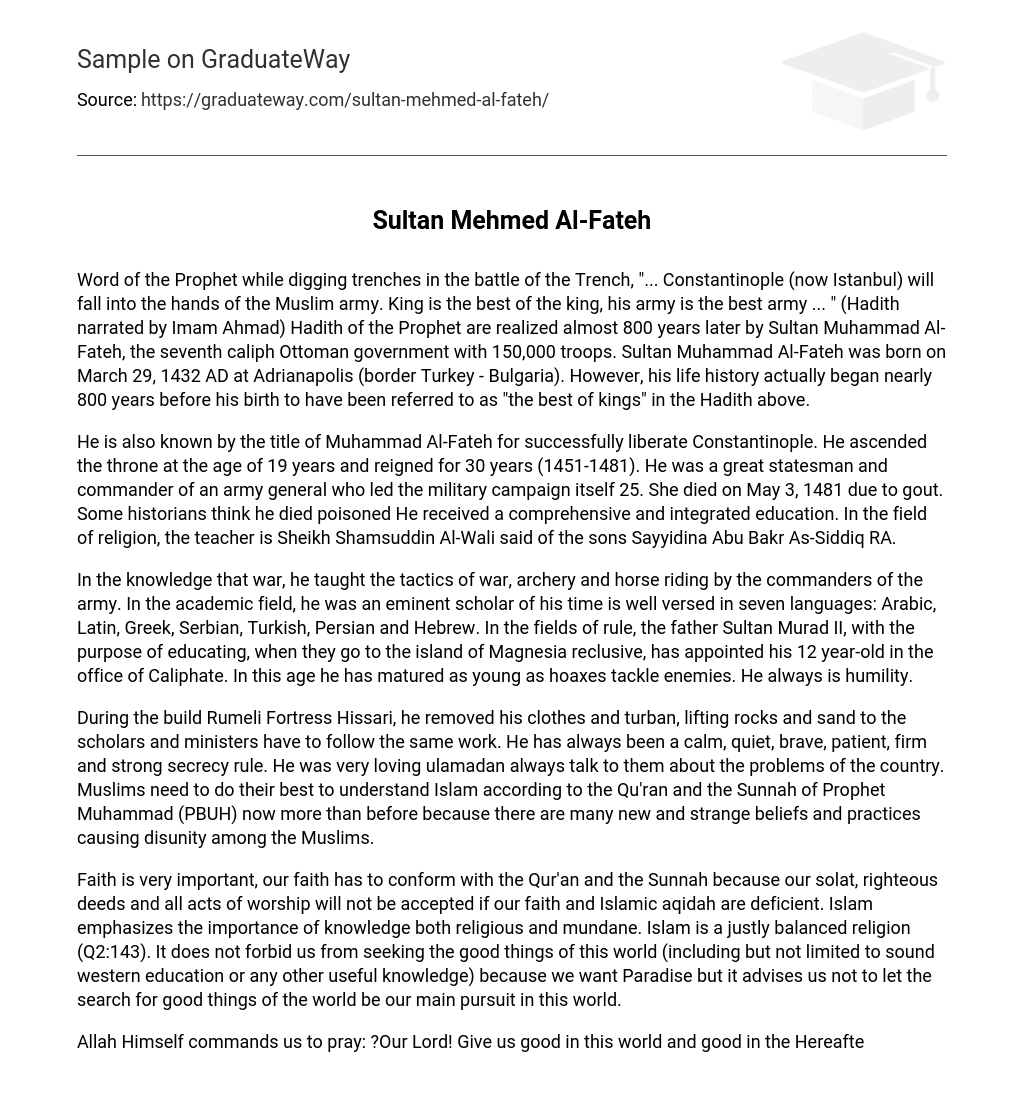During the battle of the Trench, Prophet Muhammad predicted that the Muslim army would conquer Constantinople (now Istanbul) while they were digging trenches. The Prophet praised the king as “the best of kings” and considered his army as “the best army.” It took nearly 800 years for this prophecy to be fulfilled when Sultan Muhammad Al-Fateh achieved it. Sultan Muhammad Al-Fateh was born on March 29, 1432 AD in Adrianapolis (which is located at the Turkey-Bulgaria border). Leading an army consisting of 150,000 troops, he accomplished this feat. Interestingly enough, his life history can be traced back eight centuries to him being referred to as “the best of kings” in the aforementioned Hadith.
Muhammad Al-Fateh, also known as Muhammad Al-Fateh, is renowned for successfully liberating Constantinople. He ascended to power at the age of 19 and ruled for an impressive thirty years from 1451 to 1481. In addition to being a skilled statesman, he was a formidable general who personally led twenty-five military campaigns. Unfortunately, on May 3, 1481, he passed away due to gout or possibly poisoning, as suggested by some historians. His education was comprehensive and well-rounded, with Sheikh Shamsuddin Al-Wali serving as his teacher in matters of faith; he was recognized as the son of Sayyidina Abu Bakr As-Siddiq RA.
Aside from his military expertise in tactics, archery, and horse riding, he was also a well-known scholar who excelled in seven languages: Arabic, Latin, Greek, Serbian, Turkish, Persian, and Hebrew. At 12 years old, his father Sultan Murad II appointed him as the Caliphate while they were residing on the isolated island of Magnesia with the purpose of educating him in governance. Despite his young age, he quickly matured and became skilled at outsmarting enemies with clever strategies. Throughout his life, he remained humble.
During the construction of Rumeli Fortress Hissari, he would take off his clothes and turban and help the scholars and ministers by lifting rocks and sand. He was always calm, quiet, brave, patient, firm, and strict in following the rules. He loved to talk to the scholars about the problems of the country. Muslims now, more than ever, need to put their best effort into understanding Islam based on the Qu’ran and the Sunnah of Prophet Muhammad (PBUH). This is because there are many new and unfamiliar beliefs and practices causing disunity among Muslims.
Our faith must align with the teachings of the Qur’an and the Sunnah, as it greatly affects our solat, righteous deeds, and all acts of worship. If our faith and Islamic aqidah are lacking, our efforts will not be accepted. Islam places importance on both religious and worldly knowledge. It is a fair and balanced religion (Q2:143). Islam does not prohibit us from pursuing the good things in this life, such as sound Western education or other useful knowledge. However, it cautions us against making worldly pursuits our primary focus in this world, as we strive for Paradise.
Allah commands us to pray, saying “Our Lord! Give us good in this world and good in the Hereafter and defend us from the torment on the fire!” (Q2:201). The first generation of Muslims showed a strong understanding of Islam and made contributions to scientific discoveries and various areas of knowledge. However, only a few Muslims in the current generation follow their example. Some are professors in their fields but lack knowledge about Islam, while others are Islamic Scholars but have limited understanding of other fields of knowledge.
Despite claiming old age and lack of time as reasons, many individuals with a Western education find ways to avoid learning about Islam. However, they overlook the fact that the Prophet (PBUH) and many companions embraced and studied Islam at around forty years old, showing that age is not a barrier to gaining knowledge. It is important for us to change our perspective on pursuing Islamic and other types of knowledge and education. Our primary duty is to acquire knowledge, then apply it and share it.
To become a true Muslim, it is necessary to understand the principles of Islam. Being a Muslim does not depend on birth but on gaining knowledge. It is crucial for us to familiarize ourselves with the teachings of Prophet Muhammad (PBUH) in order to have faith in him and follow his guidance. Claiming to be a Muslim without knowledge contradicts this belief. Without knowledge, a person is like someone walking in complete darkness, easily misled by shaytaan.
Our lack of knowledge about Islamic teachings and our unawareness of the teachings of the Qur’an and guidance from the Prophet (PBUH) are the greatest threats. However, if we acquire knowledge, we will see the Islamic path in all aspects of life. We can recognize and avoid dangerous paths like disbelief, polytheism, and immorality that may cross our path. Furthermore, when encountering false guides, a brief conversation will reveal that they should not be followed.
Knowledge is sought and implemented with modesty and humility, resulting in beauty and dignity, as well as freedom and justice. The primary aim of acquiring knowledge is to establish a closer connection with God. Its purpose goes beyond mere gratification of the intellect or senses. Knowledge should not be pursued solely for its own sake or for the advancement of science alone. Instead, it must be connected to values and objectives. Acquiring knowledge serves the purpose of benefiting our world rather than squandering it through wastefulness, arrogance, and an indiscriminate pursuit of material comforts.





